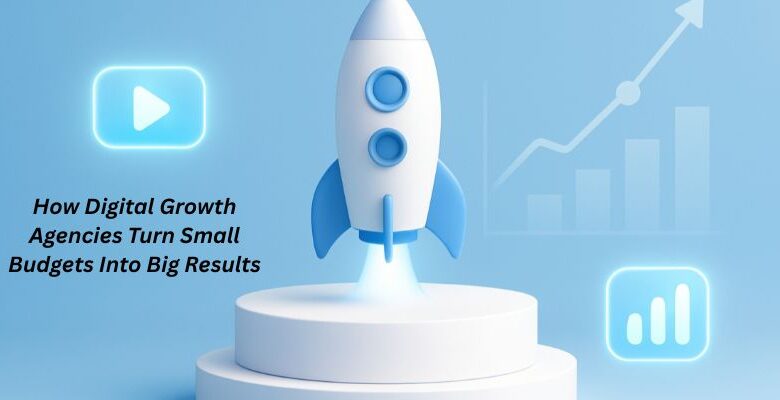
No matter what type of business you’re running, chances are you’re facing a lot of challenges. You’re not alone. The modern market has become so competitive that you need to focus on multiple things, like marketing and customer engagement, to succeed.
Doing this can seem impossible with a low budget.
Fortunately, there are many digital growth agencies out there that turn small budgets into big results. They analyze your problems closely and design budget-friendly solutions. In this article, you will learn how these agencies utilize your limited resources and deliver amazing results for your growth.
Why Rely on Digital Growth Agencies with a Small Budget?
One perception about digital growth agencies in the business world is that they usually work with big companies that have deep pockets. But that’s not true. These agencies are experienced with maximizing the growth potential of whatever resources a company has.
So, even if you have a limited budget, these companies can still deliver results.
How Digital Growth Agencies Deliver Results with Small Budgets:
Digital Growth Agencies focus on different strategies to deliver results, even with small budgets. The following points will help you understand how they do it:
The Focus Problem That Kills Budget Efficiency
The biggest mistake companies make with limited budgets is trying to be everywhere at once. They want social media presence, paid advertising, email marketing, content creation, influencer partnerships, and SEO all happening simultaneously. This approach turns a small budget into microscopic budget fragments that can’t move the needle on anything.
Agencies that excel with constrained budgets do the opposite. They pick one or two channels and dominate them before expanding elsewhere.
This concentrated approach allows for proper testing, optimization, and meaningful results tracking. A $5,000 monthly budget focused on one channel can generate real growth, while the same amount split across five channels usually produces mediocre results everywhere.
Getting More From Less Through Smart Resource Allocation
Budget efficiency often comes down to understanding the difference between expensive and valuable. Many businesses assume that cheaper options are automatically better for small budgets, but this thinking can actually waste money faster than premium choices.
Take content creation as an example. Hiring five different freelancers to produce cheap blog posts often costs more (and delivers worse results) than working with one skilled writer who understands the brand and audience. The expensive option delivers better ROI because the content actually drives business outcomes instead of just filling space.
A digital growth agency working with budget-conscious clients often recommends this quality-over-quantity approach across all marketing activities. Better to create fewer pieces of content that actually engage audiences than pumping out daily posts that nobody reads. Better to run fewer ad campaigns with proper targeting than spreading impressions across broad, unfocused audiences.
This principle applies to tools and software as well. Free email marketing platforms might seem budget-friendly, but they often lack the automation and segmentation features that turn subscribers into customers. Spending $50 monthly on a proper email platform can generate thousands in additional revenue through better targeting and automated sequences.
The Compound Effect of Sequential Investment
Smart budget management isn’t just about spending less money. It’s about spending money in the right order to create compound results. Each marketing investment should build on the previous ones, creating momentum that makes future spending more effective.
Agencies usually begin with basics like analytics, automation, and audience research. These steps may not bring instant results but make every dollar more effective. After that, they focus on owned channels such as email lists, social media, and search-friendly content. Consistent investment here often outperforms bigger ad budgets.
Only when these foundations are strong do agencies recommend paid ads, using data, content, and systems to build on existing momentum instead of starting from nothing.
Making Data Work for Tight Budgets
Here’s something most people don’t realize: small budgets actually make data more important, not less. When every dollar counts, businesses can’t afford to guess about what’s working. They need clear, actionable insights about which activities drive real business results.
This doesn’t mean expensive analytics platforms or complex reporting dashboards. It means tracking the metrics that actually matter for business growth and ignoring vanity metrics that feel good but don’t correlate with revenue. Likes, shares, and website traffic might boost ego, but conversion rates, customer acquisition costs, and lifetime value determine business success.
Smart agencies set up simple tracking to link marketing efforts with real business results. They may use Google Analytics, spreadsheets, or low-cost CRM tools, but the goal is clear visibility into what drives customers. This focus on data makes optimization faster, even with small budgets. Rather than waiting months, agencies can spot issues in days and adjust. Quick feedback loops are crucial because small campaigns cannot afford long learning periods.
Building Momentum That Outlasts Individual Campaigns
The most successful small-budget approaches create assets and relationships that continue generating value long after the initial investment. This long-term thinking separates agencies that deliver sustainable growth from those that create temporary spikes followed by inevitable crashes.
Content marketing shows this well. A single blog post may cost a few hundred dollars but can bring traffic and leads for years, unlike ads that stop once spending ends. Relationship building works the same way.
Nurturing customers, forming partnerships, and creating referral programs often deliver stronger long-term results than chasing new leads.
Good agencies also know when small-budget tactics have peaked and more investment is needed. Smart budget use is not about being cheap, but about choosing efficient service strategies that drive lasting growth.
Conclusion:
Well, there you have it. Having a small budget does not mean you don’t have the potential to grow in this competitive market. By collaborating with a competitive digital growth agency, you can reach new customers and strengthen your brand without spending a lot of money without spending a lot of money.
These agencies are experienced and know how to make the most of resources. They analyze goals the right way and only spend resources where they matter. With these types of techniques, these agencies turn limited resources to efficient growth results.



